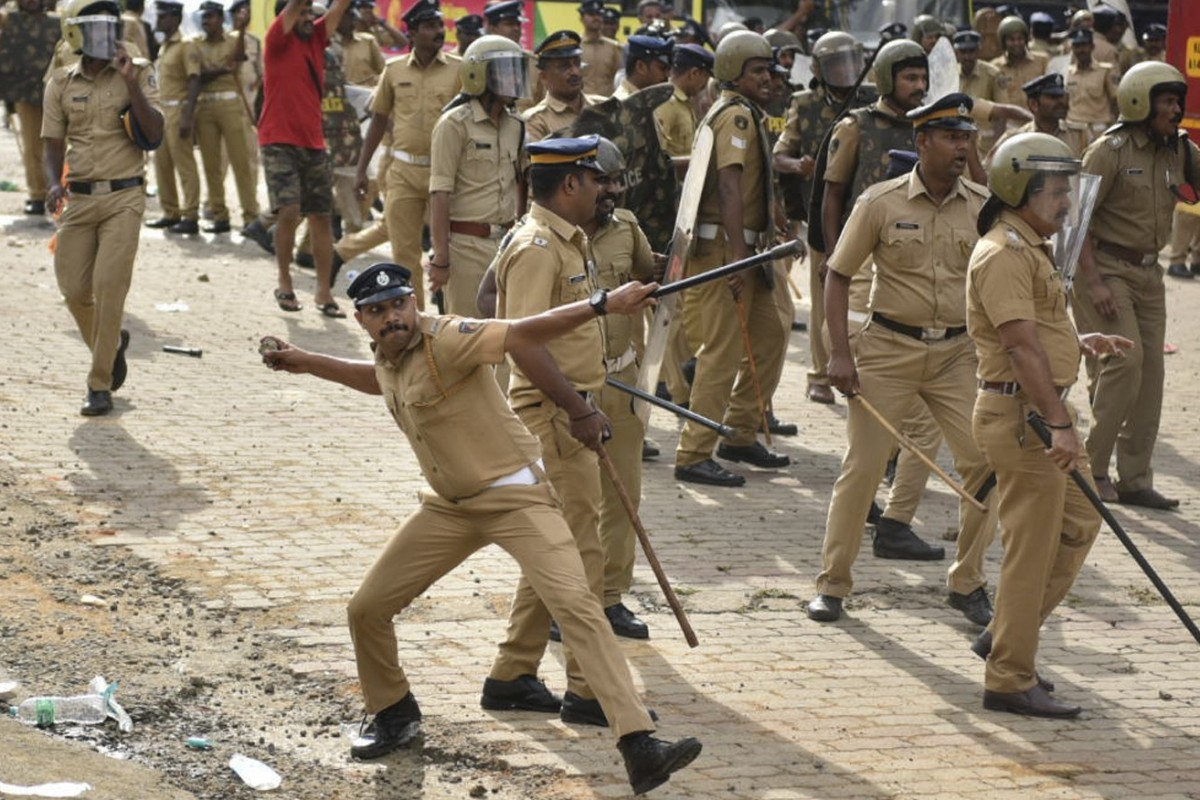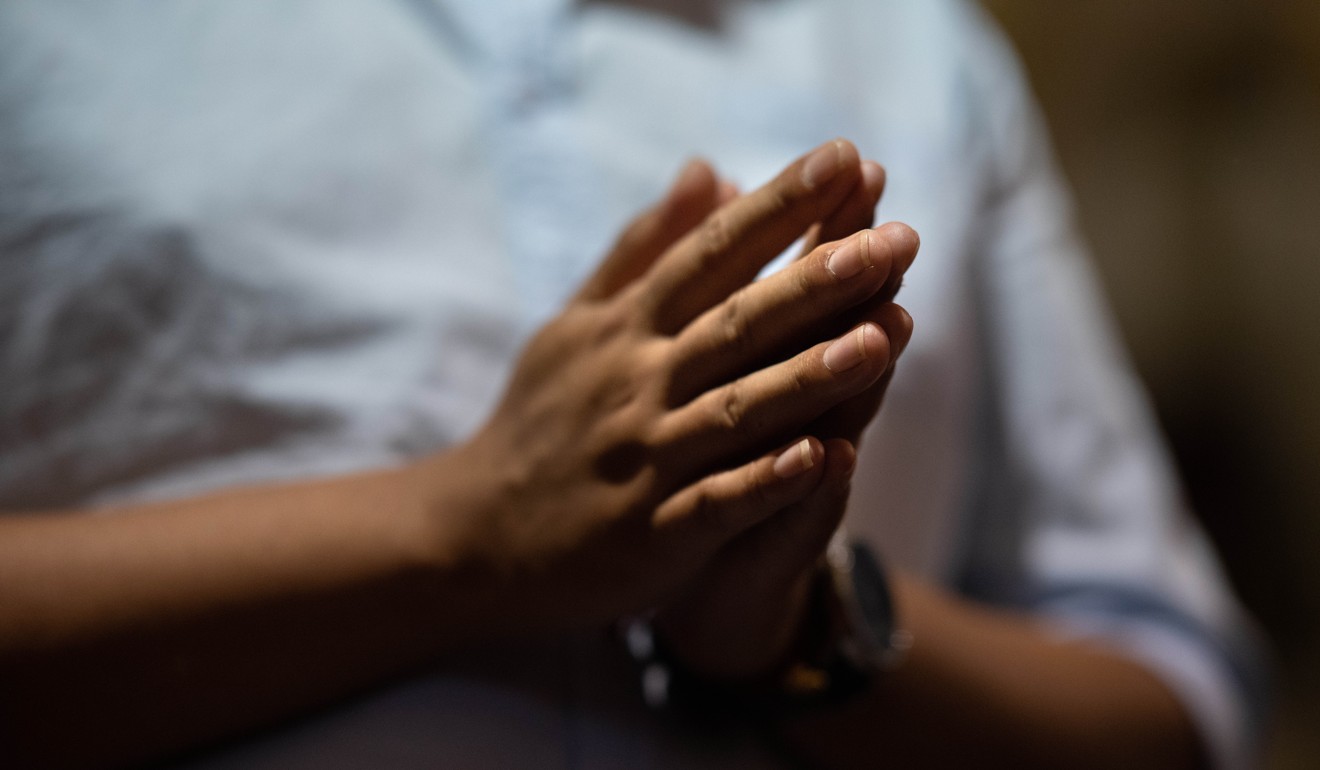- A decades-long dispute between two rival Christian factions in Kerala sparked a recent stand-off in a church at the centre of the tussle
- India’s Supreme Court ruled in favour of one faction, but authorities were afraid that implementing the order would lead to religious strife

Vasudevan Sridharan SCMP 6 Oct, 2019

Policemen deployed in Kerala, India. Photo: APA church in the southern Indian state of Kerala turned into a battleground on September 26 when hundreds of armed police descended on the tiny historic suburb of Piravom, a flashpoint of decades-long tensions between two Christian factions.
The massive police deployment was ordered after one of the factions refused to vacate the church building despite a Supreme Court order. A dozen bishops and hundreds of worshippers stubbornly remained inside the premises for several hours, singing and chanting prayers, which led to a stand-off with both police and the rival group.
Acting on a judicial order, riot police used cutters to bring down the iron gates of the building before forcibly evicting hundreds of worshippers to make way for the other faction to conduct prayers. Several bishops and protesters were arrested. Since the stand-off, security forces have remained outside the church to prevent any further incidents.
St Mary’s Church is at the centre of a tussle between followers of the Kerala Malankara Orthodox Church and the Jacobite Syrian Christian Church. The historic building is one of the 1,100 parishes and churches the two factions have been fighting over for more than half a century.
In 2017, the Indian Supreme Court ruled in favour of the Orthodox faction, ordering that the management of the Malankara churches should be handed over to them. The ruling was based on the Malankara Church constitution signed in 1934 which grants administrative control of parishes to the Orthodox group. But the verdict was not implemented over concerns of potential religious strife.
Since then, more than a dozen petitions have been filed at the apex court to reconsider its decision and all of them have been shot down, with the court continuing to uphold the 1934 constitution.SUBSCRIBE TO THIS WEEK IN ASIAGet updates direct to your inboxSUBMITBy registering, you agree to our T&C and Privacy Policy
The Supreme Court has more than once criticised the local government and lower judiciary for failing to enforce its verdict. Subsequently, the Kerala High Court set a deadline of the end of September for the Jacobites to be completely evacuated from the churches.
“Is Kerala above the rule of law? You are making a mockery of the justice delivery system,” an irked Supreme Court judge said in July when issuing a warning to the Kerala government to enforce the court order.
On September 30, the Kerala High Court ordered the state government to closely monitor the situation and retain the police deployment at St Mary’s Church for security purposes.
Tensions were quite high and anything could have happened. Even a small spark can start a forest fireA Kerala government official
Enraged by the evacuation, thousands of Jacobite followers marched to the Orthodox headquarters in Kottayam on Wednesday October 2, protesting against a “denial of justice”.
A senior government official who is presently handling the Jacobite-Orthodox stand-off said the district administration feared the situation could rapidly spiral out of control because it is a religious dispute, and that is why the order could not be carried out.
“Tensions were quite high and anything could have happened. Even a small spark can start a forest fire,” said the official, who asked to remain anonymous.

What began as minor disagreements in the church hierarchy and an internal power-struggle in the early 1900s gradually snowballed into a fully-fledged dispute which has lasted for decades. In 1911, the differences led to a formal split, which paved the way for the drafting of a constitution for the Malankara Church denomination in 1934.
This constitution – the point of departure for the latest Supreme Court verdict – has been treated as the bedrock to plug any differences between the Jacobites and Orthodox.
Thousands of Indian women form human chain across Kerala for equal access to Hindu temple
The Church of Malankara – the name derived from a Kerala village, Maliankara – formally came into existence in the 17th century after breaking free from Roman Catholic dominance in the region. The two factions do not significantly differ in their prayers, liturgy, theology and tradition. The major difference is that the Jacobites owe their allegiance to the Patriarch of Antioch while the Orthodox consider the Catholicos of the East as the final authority – two different centres of Christian power.
Though the two groups briefly reunited for about a decade in the 1960s, the truce did not last. Attempts at out-of-court solutions, including government-backed ones, failed. Clashes have turned violent in the past and deceased worshippers were not allowed burials in the rival group’s cemeteries. Over 300 churches have been shut down as a result of the power struggle.
The protesting group has turned violent and are calling for the destruction of churchesDr James Abraham Konat, principal of the Orthodox Theological Seminary, Kottayam
Whichever group has more power in the neighbourhood at the time dominates the other, imposing its tradition. Together, about two million people belong to either of these two groups in Kerala. Both factions claim they are the majority in terms of population as no reliable numbers are available.
Kerala has a sizeable Christian population – 18 per cent of the 35 million people in the state follow one of the denominations.
The bone of contention between Jacobites and Orthodox essentially remains the ownership of the church and its wealth.
Dr James Abraham Konat, principal of the Orthodox Theological Seminary, Kottayam, who represents the Orthodox faction, admits the confrontation is only for properties and not due to theological differences.
“The protesting group has turned violent and are calling for the destruction of churches. One of their bishops was openly preaching ‘if we don’t get the churches, let us destroy them’. They’re stealing the properties of the churches too,” said Konat.
He also rubbished the Jacobites’ claims that the faithful are not allowed to worship in the disputed churches, saying his faction only wants to retain the administrative powers but allows worshippers to hold prayers.
Representatives of the Jacobites could not be reached for comment.
When asked what the lasting solution to the ongoing impasse would be, Konat responded: “We all have to abide by the Supreme Court. No one can say ‘I’ll not accept the Supreme Court’s verdict’. Every Indian citizen is bound to accept it.”
